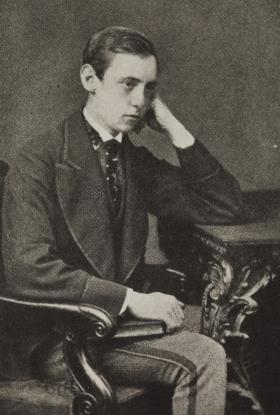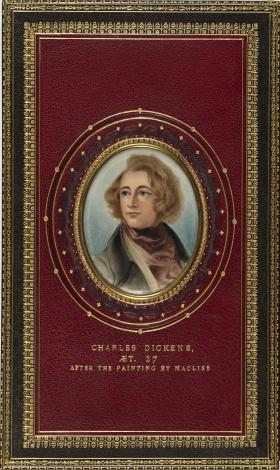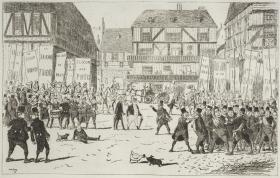Admirers of Charles Dickens — who was born on 7 February 1812 — continue to celebrate the anniversary of his birth across the world, including in Australia. Unlike Anthony Trollope, Robert Louis Stevenson and Rudyard Kipling, Dickens never visited Australia, yet he still merits an entry in the Australian Dictionary of Biography. Clues to this seeming anomaly can be found in the small but valuable trove of Dickens material in the State Library.
Throughout his life Dickens maintained an intense interest in the great social issues of the time such as charity schools, prisons and workhouses. It was his belief that one solution to these problems was emigration — sending the poor and destitute, as well as needy and worthy folk, to the colonies to make a new start — and he regarded Australia as an ideal destination. In his mind it was a utopia for the working class where the industrious would be richly rewarded.
The Library holds the original manuscript of ‘Emigration’, an article written by Dickens in 1852 promoting NSW as a desirable colony for emigrants and giving advice to intending settlers. The article appeared in Household Words, the weekly journal he founded and edited. It was just one of a stream of articles he wrote eulogising Australia and can be read in the Library’s own run of the journal.
‘Rent, clothes, and food are cheaper there, than elsewhere,’ he assured his readers, ‘and the emigrant and his family should be able to live there, for the first year, for about 100 pounds.’ He went on to claim that property too was cheap and after a year of learning the ropes ‘the emigrant would have no difficulty in making an advantageous purchase of land’.
Dickens’ enthusiasm was not confined to the written word. In 1847, with the help of the wealthy philanthropist Angela Burdett-Coutts, he established Urania Cottage, a refuge for homeless and ‘fallen’ women, who were expected to emigrate once their time there was up. Dickens suffered an early disappointment when he learned that the first group to be sent out to Australia for a new start had lapsed into prostitution on the ship. However, by 1853 he was able to report that 30 more had entered into service on arrival and were considered to be of good character.
Dickens was so convinced of the redeeming qualities of antipodean emigration that he sent two of his sons, Alfred D’Orsay Tennyson Dickens and Edward Bulwer Lytton Dickens, to settle in Australia. Both, in their father’s opinion, lacked application and staying power, which would be remedied by a colonial experience.
Alfred arrived in 1865 and quickly found work on a property at Corona. In 1870 he purchased Wangagong station near Forbes but it was not a success. He then moved to Hamilton, Victoria, to take up a position as a stock and station agent. Following the death of his wife he opened an agency in Melbourne with his brother. He was hit badly by the 1890s depression and ended up lecturing on his father’s life and works in Australia, Europe and America.

Dickens’ persistent advocacy of Australia as a suitable destination for the failed and impoverished is also evident in his novels, for he dispatched a number of his characters there. Both the Peggotty and Micawber families from David Copperfield make the voyage to the colony where the hopelessly improvident Mr Micawber achieves success as a district magistrate and respected local identity. Perhaps the best known of Dickens’ fictional emigrants is the good-hearted convict Abel Magwitch in Great Expectations, who returns to England illegally having made his fortune as a sheep farmer.
Among the eight Dickens letters in the Library’s collections are several of particular interest to Australians. On 19 November 1865 he wrote to Archibald Michie, a Melbourne lawyer who had emigrated to Australia in 1839. Michie had helped find work for Alfred and, after thanking him, Dickens provides a tongue-in-cheek account of a giant corkscrew invented by the English poet Richard Henry Horne to extract gold from the diggings.
Horne, a regular contributor to Household Words, had also emigrated to Australia where he had become commander of a gold escort and later a Goldfields Commissioner. ‘He had only to find the spot where gold lay hidden,’ Dickens wrote, ‘the corkscrew would then be worked by twelve men shipped to the Antipodes for the purpose, and all turning with a will (unless they had run away); when the corkscrew bit thoroughly, an enormous mass of gold could not choose but come up; they would all then fall over on their backs, and their fortunes would be made.’
Dickens’ interest in prison reform and its application in Australia is the subject of another of his letters held by the Library. Writing to the banker Charles Cotterell in 1846, he praises the former superintendent of the Norfolk Island convict settlement, Alexander Maconochie, whose radical system focused on rehabilitation rather than punishment. Dickens, who shared Maconochie’s distaste for current methods of prison discipline, had no doubt that his Norfolk Island model ‘will, in some modified form or other, become, as the world grows better and more compassionate, very generally received’.
Dickens’ knowledge of Australia was always second hand but at various times he contemplated remedying this by visiting the colony in person. A proposed lecture tour was unfortunately abandoned in 1862. Three years later he told Michie he still had a great desire to give readings there. ‘I seem to have done something towards its gratification,’ he wrote, ‘when I say at home (as I often do) “Who knows! More unlikely things have come to pass”.’ Sadly, in this case, they never did.
Warwick Hirst is a former State Library Curator of Manuscripts.


